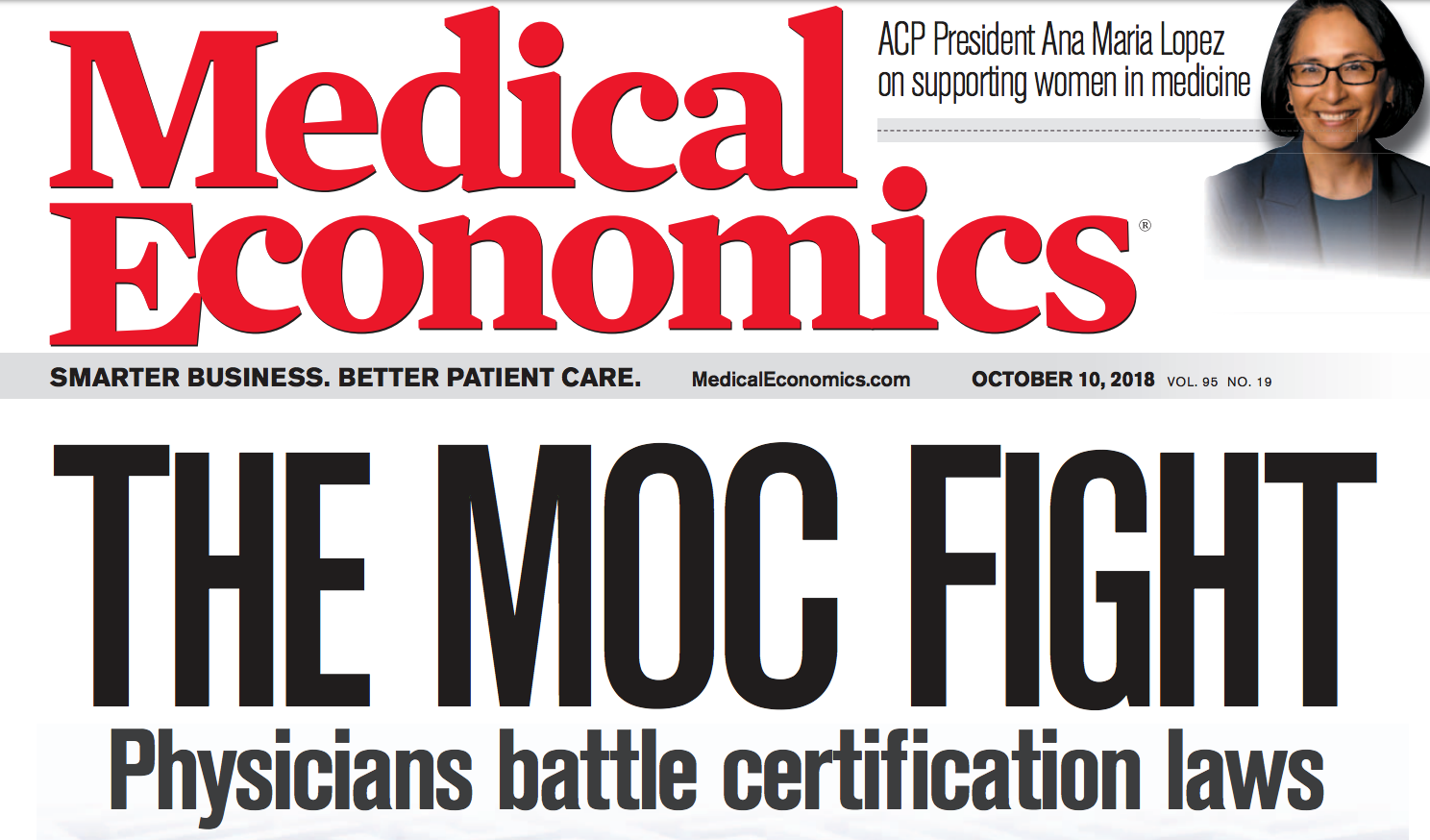The MOC Fight
From
Medical Economics:
“Physicians are pushing legislation on the state level because they don’t trust the ABMS [American Board of Medical Specialties] and its financial conflicts of interest,” says Paul Mathew, MD, a volunteer board member of the NBPAS in Cambridge, Mass. “Many feel the only way to declaw the tiger is legislative action due to insurance companies and academic institutions having no reason to change their pro-MOC policies.” The ABMS oversees MOC for its 24 boards.
-Wes

For a journal called medical economics, it seems that the article should include a cost analysis of lost wages for physicians, possible harm to patients losing access to their physicians and the cost to physicians to continue with MOC. What are the medical consequences of MOC and why hospitals and credentialing boards do not wish to stop an unproven program,
ReplyDeleteand let's not forget, with more and more hospitals employing Physicians, and contractually paying their "professional fees", MOC is costing Hospitals! Not just direct expenses like the actual ABMS fees, but travel, lodging, supplemental study materials, and of course, LOST TIME seeing patients!
ReplyDeletehttps://www.kevinmd.com/blog/2018/10/a-test-takers-worst-nightmare-became-reality.html
ReplyDeleteABMS MOC consists of two cunningly devised illegal and unethical components
ReplyDeleteMaintenance Of Cash
Maintenance Of Control
A investigation of the ABIM/ABMS shows us in a microcosm/nutshell much of what is wrong with healthcare today. Self-serving bureaucrats serving up physicians to the whim of special interests, corporate profits, and financially burdensome/complex cost rationing plans.
From Brem to Baron self-dealing professional medical politicians have skimmed the financial cream off the top of the healthcare pie for themselves, their elite partners, and made a bloody mess of things for physicians and patients.
MOC
As the requirements for cash from physicians have increased over the years, so have the resultant increases in elaborately designed cunning methods of surveillance, monitoring, and data collection.
This surveillance and monitoring fits in with the overall plan of the ABMS and their associates to deviously impose their devices of manipulation on docs and unwitting patient populations. They have been using dubious psychological and political methodologies for years with the aim of cementing financial and "ethical" levers of control over physicians.
Physicians need to pull out of this illegal and unethical MOC cash game now. It is imperative that doctors stop being cash cows for the ABMS and the special interests/ corporate profits and the underlying manipulative financial and political agendas the ABIM/ABMS clandestinely serves - and has served for decades.
By participating in MOC, doctors are being forced to engage in unhealthy, wasteful, counter-intuitive activities that are leading to their own financial and moral demise. What is worse, the coercive MOC program is unquestionably resulting in devastating consequences for the health and well being of patients in the United States.
For the first time in the history of the profession of medicine in America external interference by corporate and governmental actors with their recently imposed policies/mandates are literally destroying the physician - patient relationship.
Ill-advised government and corporate prescriptions have been legislated/imposed causing a deterioration of healthcare and the humanity underlying it beyond what anyone could imagine.
We are at the point where these unwise "prescriptions" meted out by out-of-touch and often very greedy thought-leaders are doing grave harm to both the patient and physician.
An in depth investigation is needed at the highest levels of government with an engaged inter-agency involvement to correct these ills if we are to correct the perilous course we are on.
One thing should be quite clear right now. The MOC mandate with its corrupt corporate and the collusive involvement of a myriad of NGOs to help invent and sustain it should have ended years ago. The AMA should pay for a complete investigation/lawsuit to end it. The AMA inner core needs to follow through with the House of Delegates resolution to end MOC. If they do not do so, it shows who the AMA really serves.
Is the AMA propping up the dmagaged reputation of Christine Cassel allowing her name to appear on their publications?
ReplyDelete"Government Policies Are Driving Doctors To Quit Health Care"
ReplyDelete"Doctors nationwide are burnt out and unsatisfied. Many want to quit the profession entirely, according to a new survey from the Physicians Foundation.
The government deserves much of the blame for doctors' low morale. For years, the feds have cut their pay, meddled in their decisions, and subjected them to mountains of needless paperwork. Physicians are increasingly responding by leaving active medical practice. And many of America's best and brightest are declining to go into the field."
Quote above is from an Oct 15th article in Forbes based on a Physician's Foundation survey.
ReplyDelete2018 Survey of American Physicians (Physician's Foundation)
https://physiciansfoundation.org/wp-content/uploads/2018/09/physicians-survey-results-final-2018.pdf
Don't worry about US physician shortages more PAs are coming to fill the deficit of docs
ReplyDelete"Physician assistants are a growing part of the medical workforce. By 2025, a shortage of 124,000 primary care physicians is anticipated, with a high percentage in rural areas. PAs are expected to play a pivotal role in primary patient care as health care evolves. The Bureau of Labor Statistics reflects this data, as their predictive models anticipate 37 percent job growth for physician assistants by 2026 ─ the fifth-fastest-growing health care profession over the next decade.
Mayo Clinic's PA Program will emphasize the role of PAs in rural health care settings, so that PA graduates may ease the lack of available medical care in rural environments. While 20 percent of the American population lives in rural areas, only 10 percent of doctors practice in these areas. Only 4 percent of family medicine training occurs in these areas, further exacerbating the rural health care issue. Currently, 1 in 7 PAs work in rural settings, helping to alleviate this issue by providing direct medical care as part of a closely coordinated care team with physicians."